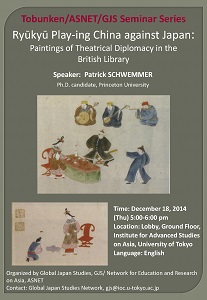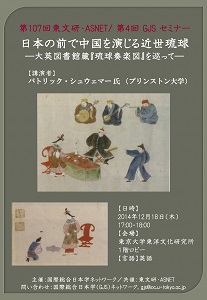以下の通り、GJS主催、東文研・ASNET共催セミナーを開催しました。
http://gjs.ioc.u-tokyo.ac.jp/ja/events/post/141218_gjs/
http://gjs.ioc.u-tokyo.ac.jp/en/events/post/141218_gjs/
【日時 / Date】
2014年12月18日(木) 17:00-18:00
Dec 18, 2014 (Thu) 5:00-6:00 p.m.
【会場 / Venue】
東京大学 東洋文化研究所 1階 ロビー
Ground Floor, Institute for Advanced Studies on Asia, The University of Tokyo
【報告者】
パトリック・シュウェマー 氏 (プリンストン大学)
Patrick Schwemmer (Princeton University)
【題名 / Title】
日本の前で中国を演じる近世琉球:大英図書館蔵『琉球奏楽図』を巡って
Ryūkyū Play-ing China against Japan: Paintings of Theatrical Diplomacy in the British Library
【要旨 / Abstract】
冊封・幕藩、両制度に属した近世琉球の外交政策の中心部として芸能があった。能楽・浄瑠璃・歌舞伎や琉球口頭文学から本説を得て琉球語で演じられる組踊が、明代中国からの使節団向けに、異国でありながら儒教などに通じた文明国としての姿勢を見せるために作られたというのは周知の通りである。ただし、私が大英博物館で発見した絵入り図録『琉球奏楽図』がこれまで知られる中でもっとも詳しく物語るように、逆に江戸上りの際、琉球使節団が将軍の前で中国語による演劇を「唐踊(とうおどり)」という名称で上演することもあった。本発表では板谷徹氏が紹介された東京大学総合図書館蔵『琉球劇文和解』、徳川美術館蔵『琉球歌舞図巻』などの諸本との異同を確認する。その結果、日本外務省蔵『通航一覧』の寛政8年の該当箇所に一致して東大本にはない、音楽、合唱曲、琉歌、団扇踊、唐踊の番組・役者目録、琉歌や合唱曲の歌詞、さらにその晩の料理の菜単まで備わっているということがわかる。なお、その絵を見ても徳川本に見られない細部描写もある。したがって、近世琉球が日本と中国、二つの本国を相手に、それぞれ適切な文芸を披露することによって自国の一種の独立を図った一相を伝えてくれる貴重な資料だということになる。
Throughout the early-modern period, the small island kingdom of Ryūkyū was putting on diplomatic shows for its two tributary masters, China and Japan: cultural pageantry was essential to most exchanges. Kumi odori, a theatre developed in Ryūkyū’s vernacular from a mix of Japanese and Ryūkyūan legends and performance traditions to entertain Chinese investiture missions, remains an important part of Okinawan culture today. However, a previously-undiscussed picture book in the British Library provides the most complete textual and pictorial record yet known of a roughly opposite phenomenon: a Ryūkyūan performance of Chinese theatre for a Japanese audience. Personnel lists, synopses, and lyrics accompany colorful paintings of orchestral and choral music, Ryūkyūan songs, fan dances, and sanshin performance, the Chinese plays—even the menu of the banquet served. Based on correspondences with records preserved by the Japanese Ministry of Foreign Affairs, I identify the occasion as the 1796 tributary mission to Edo, situate this object as the most complete record of this event yet known, and argue that Chinese performance was as important as Japanese and local forms to Ryūkyū’s theatrical diplomacy, whose basic move was to preserve Ryūkyūan independence by playing the domesticating and exoticizing gazes of Japan and China against one another.
※報告は英語で行われました。
The lecture was held in English.
GJSのウェブサイトはこちら
http://gjs.ioc.u-tokyo.ac.jp/ja/events/post/141218_gjs/
http://gjs.ioc.u-tokyo.ac.jp/en/events/post/141218_gjs/



